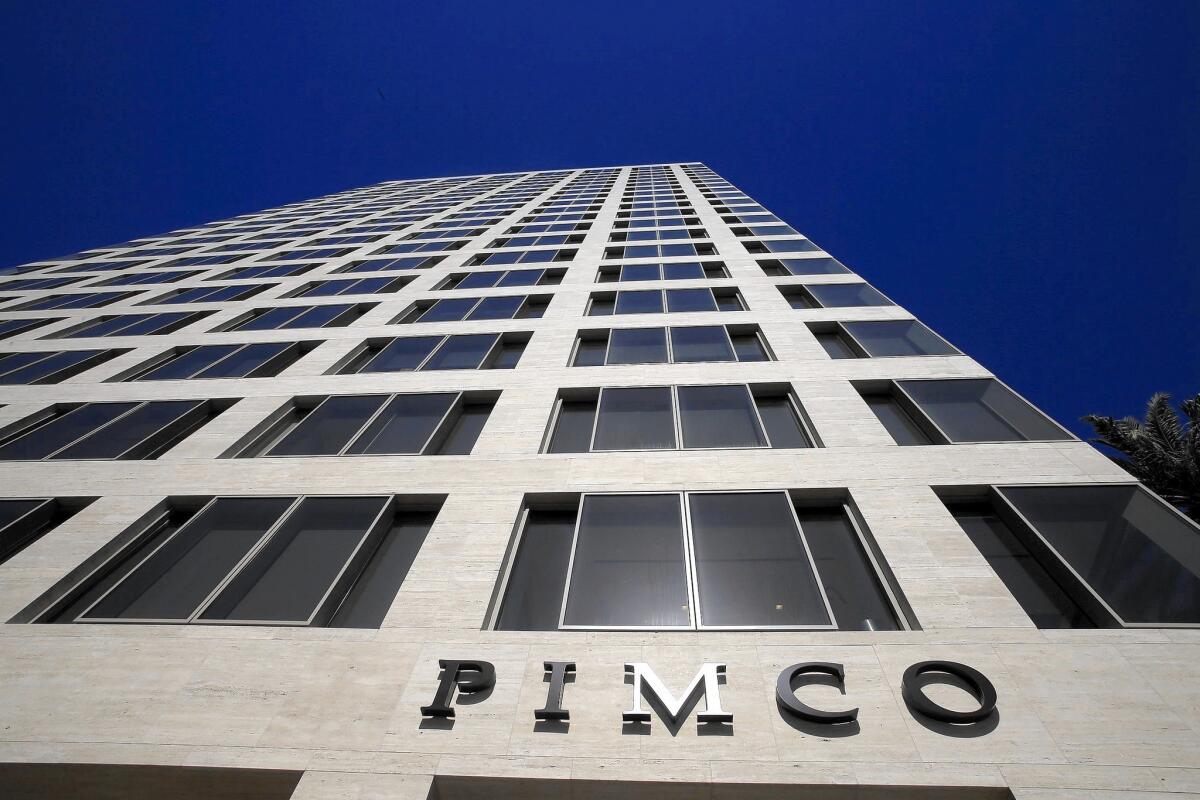Turmoil at Pimco bruises its brand

- Share via
For years, Owen Murray believed that Pacific Investment Management Co. was a safe bet for his clients for one big reason.
“They were just very, very consistent,” said Murray, investment director at a financial advisory firm for wealthy individuals in Houston.
Murray’s view was tested the last few years as Pimco’s flagship fund lagged behind its peers in producing returns. It was strained further earlier this year as reports of management turmoil filtered into public view.
It snapped altogether in September with the dramatic departure of Pimco’s co-founder and public face, William H. Gross. Murray moved his clients’ money to MetWest Total Return Fund, managed by TCW Group Inc. in Los Angeles.
“Things just seemed to have gotten rockier and rockier,” he said. “Why not move away from all this uncertainty and into something more stable?”
The bond market has been considered a sleepy backwater where investors could count on reasonable if unexciting returns, a measure of safety and a single brand name that almost no one ever questioned: Pimco.
That no-drama world may now be gone, and the once reliable pillar of the multitrillion-dollar market finds itself under more scrutiny than ever since its founding in 1971 from the old Pacific Mutual Life Insurance Co.
Pimco’s flagship Total Return Fund, which Gross built into the world’s largest bond mutual fund, long had outperformed the market — until he made a bad bet in 2011 that interest rates would rise. Since then, the fund has struggled with below-average returns.
What had been a steady stream of client defections — 16 straight months of outflows that eroded Pimco’s flagship Total Return Fund by almost a third, from $298 billion to $201 billion — burst into a flood as news of Gross’ exit was accompanied by withdrawals of what had been unheard-of sums.
Last month alone, Pimco funds shed $48 billion, all but $6 billion of it from Gross-managed funds, according to research firm Morningstar Inc.
Adding to the funds’ lackluster performance was the corporate turmoil that began in January with the sudden departure of Mohamed El-Erian, Pimco’s chief executive and Gross’ heir-apparent as chief investment officer, amid reports of disputes between the two. Gross himself left abruptly Sept. 26.
Since then, Pimco has taken an array of steps to restore order and reassure investors that they are better off now than they were six weeks ago. It rapidly installed a new investment hierarchy led by Daniel Ivascyn as the new chief investment officer. It also hired a string of high-profile investment talent, including many who had left in the aftermath of El-Erian’s departure.
And its managers have launched a public and private campaign to promote the new team and emphasize the message that the firm had never been a one- or two-man band but had always operated within a team-oriented structure.
The question is: Has that been enough?
On one level, the answer seems to be, yes. Worst-case scenarios — in which redemptions lead to a fire-sale of assets, leading to poor performance, leading to more redemptions and a downward spiral — have not come to pass.
Although September and October withdrawals were huge, the company has been quick to point out that the overwhelming majority of them occurred in the days after Gross left and tapered dramatically toward the end of October.
And even at its current size of $170.9 billion, Pimco’s Total Return Fund dwarfs its nearest rivals. Pimco as a whole, with more than $1.8 trillion under management, remains an enormous presence in financial markets and dominates its main market, bonds.
Still, as Murray’s experience suggests, Pimco’s biggest loss might be its aura of inevitability. Powered by years of outperformance, Pimco became the ultimate safe choice for many institutions, particularly for pension funds looking for non-controversial places to invest in fixed income and for retail investors looking for a brand name.
“The reality is, there’s a lot of really good bond managers out there if you want to get away from the drama,” said Mark Wilson, chief investment officer for Tarbox Group, a Newport Beach financial advisory firm that pulled its money from Pimco because of problems it saw before Gross left.
Now, however, Wilson acknowledged that had the firm stayed at Pimco, “I’d actually feel better today than I would have two weeks ago.”
Indeed, several financial advisors and money managers gave the company high marks for navigating what they considered an extraordinary management crisis, and they expressed confidence in the new team.
“No firm is perfect,” said Dave Welty, managing director of Retirement Asset Management in Bellevue, Wash. “Well before Bill’s departure, they began building out a team approach.”
“We’re sticking with Pimco,” said Stanley F. Ehrlich, who runs a Westfield, N.J., advisory firm. “I favor the team approach as opposed to having a rock star above others.... Pimco has a very deep bench of talent, and this is about far more than just one person.”
Even so, institutions that haven’t pulled their funds are, like the California Public Employees’ Retirement System, quick to emphasize that its commitment to Pimco is now under the spotlight.
“We will continue to monitor developments at the firm and will conduct a thorough analysis of our exposure managed by them,” CalPERS has said.
Robert Schmansky, a financial advisor in Livonia, Mich., said he rarely recommended Pimco because of the presence of financial derivatives in its portfolio. After Gross left, he recommended his clients move or at least reconsider their options.
But that’s all part of the new reality for Pimco.
“For a long time, Pimco was the default, safe choice, and now [recent turmoil] probably causes people to take a look-and-see,” said Dryden Pence, chief investment officer for Pence Wealth Management, a Newport Beach money management firm. “But that’s probably good for Pimco and good for investors.”
More to Read
Inside the business of entertainment
The Wide Shot brings you news, analysis and insights on everything from streaming wars to production — and what it all means for the future.
You may occasionally receive promotional content from the Los Angeles Times.











